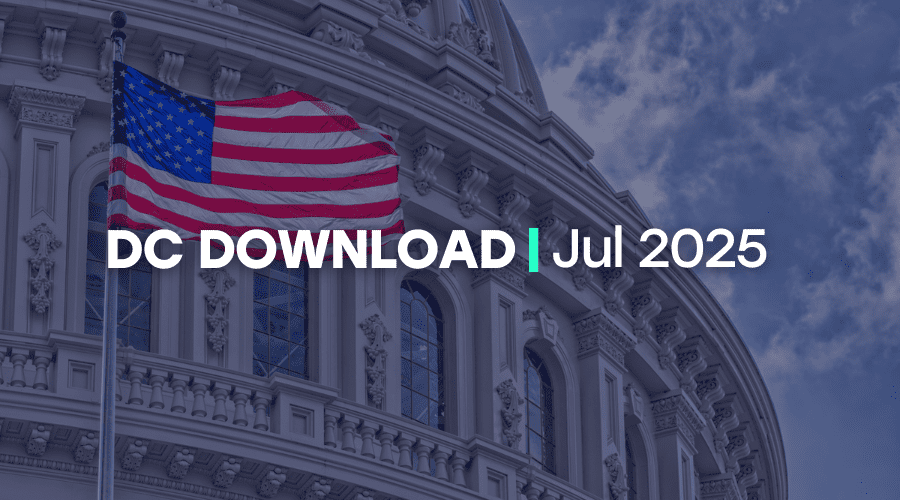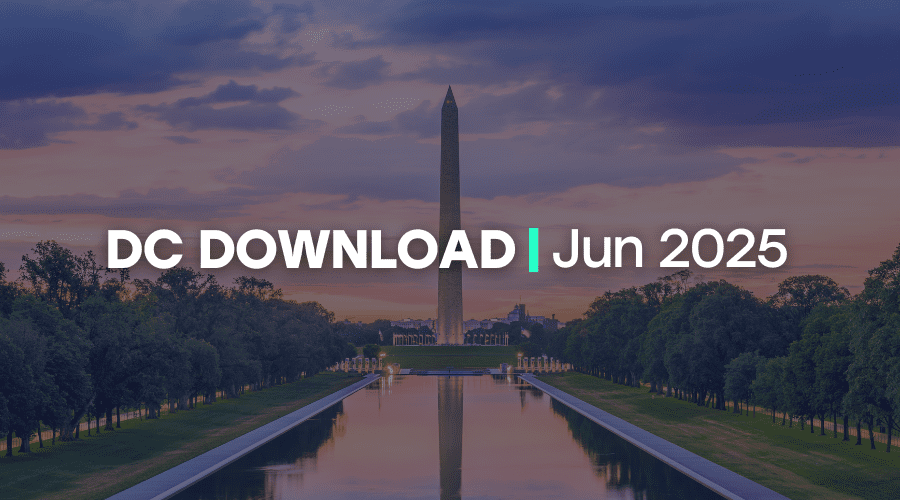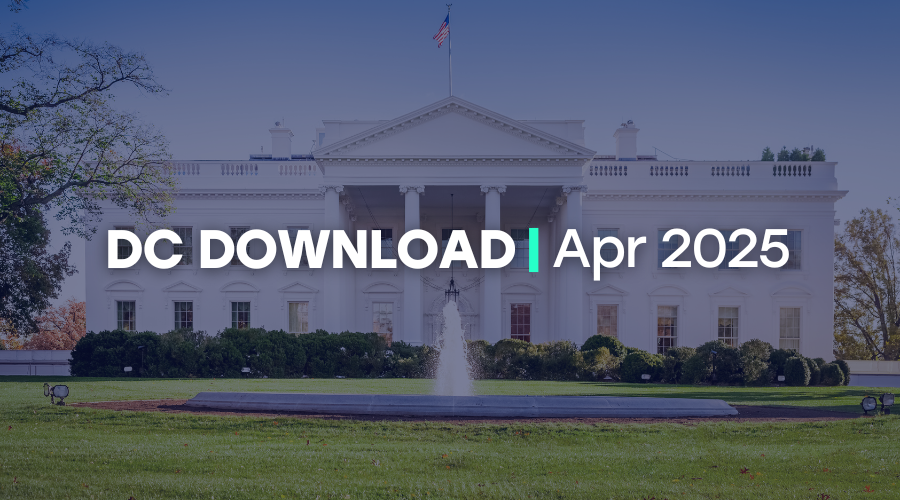July is National Ice Cream Month — and just like your favorite scoop shop, the charitable sector offers many flavors of impact, from food security and housing to education and disaster relief. As Congress juggles a shifting mix of legislative priorities this summer, our sector is making sure that the needs of communities stay at the top of the agenda.
From tax policy and federal funding to workforce development and health care access, nonprofits are engaging on a broad range of issues that reflect the diversity of our work. While lawmakers debate what gets served next, we’re showing up to remind them that the charitable sector is essential — and deserves more than just sprinkles of support.
One Step Forward, Two Steps Back: Charitable Giving in the Wake of the Reconciliation Package
The past few weeks have brought heightened tension surrounding the passage of Republicans’ large-scale tax and spending legislation – sometimes referred to as the One Big Beautiful Bill Act (OBBBA) – signed into law on July 4, 2025. Its passage reflects the critical efforts of nonprofit organizations in securing key protections for the charitable sector and its donors amid sweeping policy shifts that harm those practices. While the bill introduces sweeping policy changes, the charitable sector secured an important win for individual donors – one that encourages new contributions and helps to protect the sector’s operational capacity and financial resilience.
The expansion of the non-itemizer deduction allows individual taxpayers to deduct up to $1,000 for single filers and $2,000 for joint filers, even if they do not itemize their tax returns. This marks an important shift toward more inclusive charitable giving, enabling a broader base of donors to participate in community investment. Members of the Senate Finance Committee—alongside leading charitable nonprofit organizations the Charitable Giving Coalition, United Philanthropy Forum, the Association of Fundraising Professionals, and Independent Sector—successfully advocated for the inclusion of this provision. It’s a meaningful acknowledgment of the value of collective giving—one that strengthens local organizations and encourages ongoing civic engagement.
However, the win is buried beneath a series of harmful provisions that collectively undermine the charitable sector’s long-term sustainability. The bill introduces a series of structural changes that threaten to significantly undermine charitable giving. It requires people who itemize their taxes to give more than 0.5% of their income before they can start claiming a charitable deduction, which may lead some donors to give large amounts only once every few years instead of making regular yearly donations. It also institutes a 35% limit on the value of itemized deductions for high-income taxpayers—a shift projected to reduce philanthropic giving by $41 to $61 billion over the next decade. Critically, the bill introduces a 1% floor on corporate charitable giving, requiring corporations to donate at least 1% of their taxable income before qualifying for any charitable deduction. These provisions raise barriers to giving, limit access to essential services, and create deep uncertainty about the nonprofit sector’s capacity to meet rising community needs. Recognizing the lasting damage these provisions could cause to the charitable sector, Independent Sector opposed the passage of the bill and will continue to work with legislators to overturn these harmful provisions.
Clock Ticking on FY26 Appropriations as Congress Eyes September 30 Deadline
With the reconciliation package behind them, lawmakers on Capitol Hill are beginning to refocus their attention on another pressing matter: funding the federal government for fiscal year 2026. Congress must pass all 12 annual appropriations bills—or a continuing resolution (CR)—before the September 30 deadline to avoid a government shutdown. So far, only 2 of the 12 bills have cleared the House, while the remaining 10 are still working their way through the legislative process. Even after House passage, each bill must still move through the Senate, where the process could look quite different from the one in the Lower Chamber.
While Congress could advance these bills individually, history suggests they may once again be combined into a larger omnibus package. With the House starting their summer recess a week early and the Senate swamped with Cabinet nominations, it’s increasingly unlikely that Congress will complete its appropriations work on time. A CR to extend current funding levels into the fall appears increasingly probable. But as Republican leadership contends with a fractured majority and shattered trust with Democrats resulting from the passage of a partisan recissions package, even a short-term funding bill could face obstacles—raising the specter of a government shutdown. While rare under a single-party controlled government, shutdowns under a trifecta government are not unprecedented, and the coming weeks will reveal whether lawmakers can avoid another one.
Two Churches Battle against Johnson Amendment: Blurring the lines of Political Involvement
The ongoing lawsuit challenging the Johnson Amendment has sparked another attempt to politicize the traditionally nonpartisan stance of nonprofits, churches, and charitable organizations. The Johnson Amendment, authored by then-Senator Lyndon Baines Johnson, created a clear boundary for 501(c)(3) organizations prohibiting them from engaging in political campaigns or endorsing candidates for public office. Its purpose has always been to ensure that nonprofit activities remain dedicated to the public good rather than advancing a political figure or ideology.
However, currently before the United States District Court for the Eastern District of Texas, two churches and two advocacy groups have filed a lawsuit in federal court arguing that the Johnson Amendment’s nonpartisan provisions violate the First and Fifth Amendments of the U.S. Constitution. They contend that the restrictions unfairly prevent them from speaking on partisan political matters and highlight what they view as inconsistent enforcement by the IRS. Although the pending judgment is directly applied to the plaintiffs, it now increases the probability of other religious entities pushing against the IRS enforcement of the Johnson Amendment due to the weakened application of the language now surrounding the ruling.
If successful, this challenge could open the door for religious organizations with 501(c)(3) status to actively engage in political activities, fundamentally altering the landscape of nonprofit governance. Recent polling released by Independent Sector shows strong bipartisan support for keeping politics out of charity work. Three-quarters (75%) of voters believe that charitable organizations should continue to be prohibited from endorsing or opposing political candidates — including 69% of frequent churchgoers. There has always been a delicate line regarding how faith-based entities address electoral politics, but this lawsuit raises broader concerns: if the Johnson Amendment is weakened or struck down, it risks blurring the lines of trust within communities and could potentially allow tax-exempt funds to influence preferred political candidates. This raises fears among community members that their donations to churches and religious organizations could be redirected to support political candidates they do not endorse, rather than be reinvested in the community work these institutions were created to do.
The current lawsuit not only challenges the foundation of the Johnson Amendment but also threatens the integrity of all 501(c)(3) organizations. If these entities are allowed to align with political officials and agendas, it risks undermining their ability to serve communities effectively and authentically—especially when those political positions may not reflect the needs or values of the people they aim to support.
Bipartisan Bill Would Level the Playing Field for Small Nonprofits Offering Retirement Plans
A bipartisan group of lawmakers has introduced the Small Nonprofit Retirement Security Act (S. 2365 / H.R. 4548), a bill designed to help small nonprofit organizations offer retirement plans to their employees by extending key federal tax incentives currently available only to for-profit employers. Introduced by Senators James Lankford (R-OK) and Catherine Cortez Masto (D-NV) in the Senate, and by Representatives Vern Buchanan (R-FL), Jimmy Panetta (D-CA), Blake Moore (R-UT), and Brad Schneider (D-IL) in the House, the bill would address a long-standing inequity by allowing nonprofits to apply SECURE Act start-up tax credits against their payroll tax liability. This fix would make it easier for nonprofits—which employ nearly 10% of the U.S. workforce—to offer retirement plans by providing up to $5,000 per year in start-up tax credits and an additional $500 annually for automatic enrollment. Independent Sector has been on the Hill advocating for the bill’s passage to ensure nonprofits can access the same retirement tools as their for-profit counterparts.
Protecting PSLF: Why the Department of Education’s New Proposal Raises Red Flags
The Public Service Loan Forgiveness (PSLF) program was created by Congress in 2007 to ensure that student loan borrowers working in public service—including for 501(c)(3) nonprofits—could access student debt relief after 10 years of qualifying payments. The law is simple and clear: employment at a 501(c)(3) organization qualifies, regardless of the mission of the organization. However, the U.S. Department of Education is expected to propose a rule change that would allow it to exclude certain nonprofits from PSLF eligibility based on the nature of their work, including nonprofits that engage in what the Department deems to be “substantial illegal activity”—a vague and subjective classification that opens the door to the political targeting of organizations. If enacted, payments made while employed by such an organization would no longer count toward PSLF once the employer is disqualified—raising serious concerns for current borrowers.
Independent Sector supports efforts to maintain the integrity of PSLF, and we strongly oppose any attempt to exclude nonprofits based on their mission or the communities they serve. The law already provides a clear mechanism to respond if a nonprofit is violating the law—the IRS can revoke its 501(c)(3) status. That revocation automatically removes its eligibility for PSLF. Creating a parallel process where the Department of Education selectively disqualifies organizations opens the door to politically motivated decisions that undermine both the law and borrowers’ trust in the program. It is also unclear whether the rule would apply retroactively, which could devastate borrowers who made payments in good faith, believing their service counted.
When the Department formally releases its proposal, a public comment period will follow. Independent Sector will be closely monitoring the process and will alert you when there is an opportunity to weigh in—whether by submitting individual comments or signing onto a collective letter of opposition. We’re committed to protecting PSLF and the nonprofit workers who rely on it.
Congressional Hearings Target Nonprofits with Alarming Rhetoric
In mid-July, two House committees held hearings that put nonprofit organizations squarely in the political crosshairs. On July 15, the House Judiciary Subcommittee on Oversight hosted a hearing titled “How Leftist Nonprofit Networks Exploit Federal Tax Dollars to Advance a Radical Agenda”, followed the next day by a Homeland Security Committee hearing, “An Inside Job: How NGOs Facilitated the Biden Border Crisis.” As the names suggest, both proceedings relied heavily on charged, partisan rhetoric and appeared aimed more at discrediting disfavored nonprofits than fostering serious oversight.
While these hearings reflect a concerning trend of politicizing the nonprofit sector, Committee Democrats made clear that, even when they disagree with a nonprofit’s mission, they firmly support its right to exist and operate without fear of political retribution. With more hearings of this kind expected in the months ahead, we will continue to monitor developments closely.
Register Now for Independent Sector’s National Summit 2025
Registration is open for Independent Sector’s National Summit 2025, taking place October 27–29 in Atlanta! As our sector rises to meet urgent challenges and long-term needs, don’t miss this unique opportunity to join leaders and professionals from across the charitable sector to align on solutions, elevate our collective voice, and drive lasting change. Help shape the future of the charitable sector. We look forward to seeing you there!
Travis Swanson is the Government Relations Manager at Independent Sector



